Palestine

The most theologically significant prayer at the ceremony, however, was offered by John Hagee, a megachurch pastor from San Antonio. Hagee, a longtime supporter of Israeli policies, thanked the Lord on this occasion “that Jerusalem is and always shall be the eternal capital of the Jewish people.”
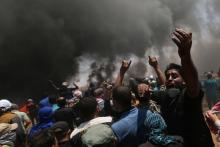
U.S. President Donald Trump announced last December plans to relocate the U.S. embassy from Tel Aviv to Jerusalem, in a move to recognize Jersualem as the capital of Israel, upending decades of U.S. policy and outraging Palestinians.

Peacemaking isn’t a passive withdrawal from conflict — it’s an intentional movement toward it with tools to understand, heal, and transform. It’s time for Christians across the U.S. to engage in this conflict in a helpful, curious way. I know there is a lot of confusion and complexity around this and, for the sake of my friends (Jews, Christians, and Muslims) in the region, as well as our collective wellbeing, I feel compelled to offer a few brief observations on today’s announcement by President Donald Trump on the U.S. embassy and the status of Jerusalem as the capitol.

On Monday, five members of an interfaith delegation traveling to Israel/Palestine were prevented from boarding their flight. The reason? Their public criticism of the Israeli government’s treatment of Palestinians. “Very quickly we were given a list of names by the airline of people who were not allowed to board,” Alana Krivo-Kaufman from Jewish Voice for Peace told Sojourners. “They were instructed by Israeli immigration to not allow us to board the plane.”
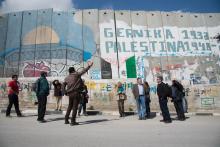
Early this month, the Mennonite Church USA succeeded overwhelmingly in passing a resolution in support of peace and justice in Israel/Palestine — and it was no easy feat. As an eyewitness and active participant to the activities leading up to this landslide vote, I can tell you the road there was tough, agonizing, and expensive.

Sister Joan Chittister opens her latest book with the story of Abba Zosimas, a fifth-century monk in Palestine. Abba Zosimas taught his followers, “The soul has as many masters as it has passions.” Chittister wants her readers to look “gently, kindly but clearly,” at those masters and passions in their lives, she said.
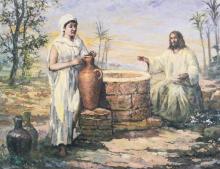
I continue to be surprised and disappointed by ubiquitous interpretations of [the Samaritan woman] as a “whore” or “prostitute.” John is using symbolism — the woman represents Samaria, which, according to Jewish reckoning, worshipped the five foreign gods. Samaria was seen as being partially faithful to the covenant (“the one you have now is not your husband”). John depicts Jesus as the bridegroom. When the Samaritan woman joins Jesus, the symbolized, divided but related ethnic groups will stop fighting …”

The 2016 Democratic National Convention party platform includes much that religious progressives from multiple faith backgrounds might like. Approved July 25, it calls for expanding LGBT rights, combating climate change, and narrowing the income gap. Here are some of the hot-button social proposals.

Stuart Levy, a nurse at a Jerusalem hospital, updates his ward’s work schedule several times a week, with staffers’ vacations, birthdays and more religious holidays than many people know exist.
“We have 18 hospital beds, and on any given day we may have an Orthodox Jew next to a devout Muslim next to a Catholic next to a Druze next to a Russian Orthodox patient,” said Levy, head nurse of the oncology/hematology ward at Hadassah Medical Center-Ein Kerem. “And many of our staff are religiously observant.”

On the eve of her religious denomination’s quadrennial meeting, Hillary Clinton wrote a letter to Jewish agency heads saying she opposes the Boycott, Divestment, and Sanction movement targeting Israel, which the meeting will consider.
“I believe that BDS seeks to punish Israel and dictate how the Israelis and Palestinians should resolve the core issues of their conflict. This is not the path to peace,” Clinton wrote in a letter May 9 to David Sherman, chair of the Israel Action Network, and Susan K. Stern, vice chair of the Jewish Federations of North America.
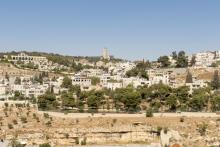
THE ROAD WAS bumpy—full of deep holes and harrowing possibilities for slippage down a roadside slope. My heart raced as I considered the possible headline back home: Bus tumbles down Israeli slope—50 Americans killed by Palestinians. Yes, that would likely be the headline, but it wouldn’t tell the story.
As our bus rolled through this stretch southwest of Bethlehem, my heart raced as Amal Nassar explained that the area had been declared property of the Israeli state decades ago. Since then, Israel built smooth roads, but we weren’t allowed on them. To the right of our bouncing bus was an adjacent highway reserved for Israelis—Palestinians are restricted from driving on these Israeli highways, relegated to the old dirt roads.
Our bus wound around sharp corners, up a hill until it came to a stop. There didn’t seem to be any building structures in sight so I wondered why we’d stopped. Nassar explained that the Israeli government had set large boulders in the middle of the road to block traffic from reaching her family’s farm, so we would have to hike the rest of the way.
We stepped off the bus and onto a dirt road strewn with rocks and trash—old tires, plastic bags, plastic bottles. When the Israeli government claimed the land, it ceased basic services such as trash pick-up, electricity, and running water to Palestinians in the area. It was an effort to make life so difficult that the Palestinians would choose to leave—in modern human rights terms, the world calls this ethnic cleansing. Nassar explained that many families have chosen to leave. Once they are gone for three years, the Israeli government claims that their property has been abandoned and that the state then has legal grounds to claim the power of eminent domain over the land.
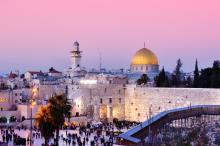
The largest gathering of Muslim leaders in the world kicks off a five-day conference that will call for a new peace process to end the Israeli-Palestinian conflict. Other weighty issues at the Organization of Islamic Cooperation summit include combatting extremism within Muslim nations, countering Islamophobia in the rest of the world, and protecting the Rohingya — a group of Muslims suffering persecution in Myanmar.


Sometimes it takes a friend to tell you that you’re an idiot. Actually, Anat was kinder than that — in keeping with rabbinic teaching that reproof needs to be done for the benefit of the admonished rather than the admonisher (which is harder than it seems, given the feel-good buzz of self-righteousness).

The Palestinian Authority has asked municipalities to tone down their public Christmas celebrations this year amid escalating violence between Palestinians and Israelis.
Hana Amireh, who heads a government committee on churches in the West Bank, confirmed the Palestinian Authority is requesting “a certain decrease” in festivities following the deaths of dozens of Palestinians since mid-September. The majority of them were killed during clashes with Israeli forces or carrying out terrorist attacks, according to the Israeli government.
Amireh said the government has asked the municipality of Bethlehem, the town where Jesus was born and where official Palestinian celebrations of Christmas take place, not to set off holiday fireworks this year and to limit the festive lights and decorations that traditionally adorn the town to two main streets.

WALTER BRUEGGEMANN is a leading authority of Old Testament interpretation and author of more than two dozen books. In this book he seeks to make a contribution to the application of biblical concepts of God’s chosen people and the promised land in the light of the contemporary Israeli-Palestinian conflict.
This book is slim, focused on the social justice issues and the relevance of key readings of Hebrew scripture to this conflict. It is written to be a manual for group discussions, particularly by Christian groups in churches. Brueggemann focuses on three main themes and their roots in scripture: the meaning of the “God’s chosen people,” the donation of the “holy land” to the “chosen people,” and the relation of Zion and Israel.
The “chosen people” are chosen by God as an arbitrary decision, writes Brueggemann, not based on any superiority of that people to others, but only on God’s love for them. It is an unconditional decision by God to choose this people with whom to have a special relationship. Yet this idea evolves in Israel’s history. There develops the theme that the people of Israel will be held especially accountable by God because of this relationship and punished for their iniquities (Amos 3:2). Isaiah suggests that, in a redemptive future, Egypt and Assyria will be chosen alongside Israel as a “blessing in the midst of the earth” (Isaiah 19:24-25).
Later heirs of the biblical tradition reinterpreted the idea of the chosen people to apply to themselves. Some in the Christian church saw itself as inheriting the status of God’s chosen people. Some in the United States regard this nation as a chosen people, occupying a new “promised land.”

THE IMAGE OF Palestinian teenagers pulling out knives and attempting to stab heavily armed, flak-jacketed Israeli soldiers—or civilians, right in front of the soldiers—serves as a sad metaphor for Israel-Palestine these days. The desperation, the futility, the massive disproportionality of firepower—it’s all there.
Of course, what really happened in recent violent incidents is subject to contentious dispute, as is so much else in the region. Take, for instance, a mid-October clash in East Jerusalem. The Israeli police gave their version of events: Border police officers confronted a Palestinian man, who pulled a knife and tried to stab them. They fired at him to “neutralize” the attack, and he died of his injuries.
The Palestinian News and Information Agency’s version added significant details: The “man” killed by Israeli soldiers was actually a 16-year-old named Muta’az Owaisat, and the agency reported that the police quickly imposed a military cordon to keep journalists from the scene, near an “illegal Israeli settlement.” The report added, “Earlier Saturday, an 18-year-old Palestinian ... was shot by an Israeli setter in central Hebron, in the southern Western Bank, where he was left to die by Israeli soldiers who prevented paramedics from administering medical assistance to him.”
An anecdote in The Washington Post illustrated the senselessness of the violence: “As an atmosphere of fear and vengeance spread, a young Jewish Israeli stalked an Ikea parking lot in Kiryat Ata, a town in northern Israel, apparently looking for Arabs to attack,” the Post reported. “He repeatedly stabbed a man who turned out to be Jewish himself.”
A lot of ink is spent explaining what “caused” these latest outbreaks—it’s usually summarized as Israel’s attempts to restrict Palestinians from entering the area of East Jerusalem that houses the al-Aqsa Mosque (and the Temple Mount). But in some ways, looking for a single precipitating cause misses the point. Sometimes, such eruptions are simply a case of a people saying, “I’m not going to take this anymore.”
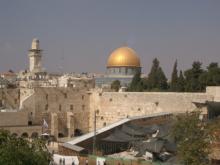
In a bid to defuse the wave of Palestinian violence that has struck Israel and the West Bank during the past few weeks, Israeli Prime Minister Benjamin Netanyahu on Oct. 8 prohibited all of the country’s parliamentarians from visiting the Temple Mount, a contentious site holy to both Jews and Arabs.
Netanyahu made the controversial decision in order to quell Muslims’ fears that Israel was preparing to assert sovereignty over part or all of the Mount, the site of the Al-Aqsa Mosque and Dome of the Rock, and the long-destroyed Jewish Biblical Temples. Netanyahu has long denied such intentions.
Far-right-wing Jews, including Israeli agricultural minister Uri Ariel, say Jews should have the right to pray at Judaism’s holy site, and some have vowed to build a Third Jewish Temple on the Temple Mount. Arab leaders, including Palestinian President Mahmoud Abbas, have said such a move would result in a regional war against Israel.
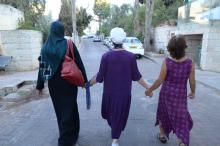
An interfaith group gathered in a private home Sept. 21 to head off potential tensions over how Jews and Muslims celebrate Yom Kippur and Eid al-Adha, two holidays that overlap this year.
The meeting of the Abrahamic Reunion took on added significance in Jerusalem, where more than a week of violent clashes between Israelis and Palestinians on the Temple Mount have spilled into the streets of East Jerusalem.
Two dozen people of various faiths heard a rabbi explain the laws and traditions of Yom Kippur, the Jewish Day of Atonement, and a Muslim sheikh explain the laws and traditions of Eid al-Adha, the Muslim holiday that honors the willingness of Ibrahim (the biblical Abraham) to heed God’s order to sacrifice his son.
The day culminated with an interfaith peace walk between the eastern and western parts of the city. Israel captured East Jerusalem in 1967 and considers it part of its capital. The Palestinians say East Jerusalem must be the capital of a future Palestinian state.
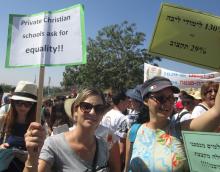
Israel’s 47 Christian schools are entering the second week of an open-ended strike to protest ongoing cuts in government allocations, which they attribute to government discrimination against minority religious groups.
The schools, 40 of them Catholic, teach 33,000 Christian and Muslim Arab students in central and northern Israel.
Officials from various Christian denominations called the strike on Aug. 31, after nearly two years of negotiations with the Ministry of Education failed to convince the government to reinstate the funding it has withdrawn from the country’s semi-private schools during the past six years.